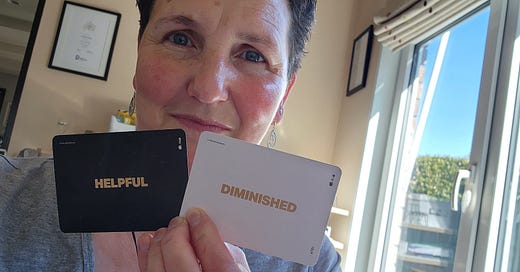A funny thing happened to me today. I got some feedback I wasn't expecting and it tripped an identity trigger.
It was easy to understand, so it wasn't like I had to spend ages trying to decipher the key message - I simply wasn't selected to do a particular job. The end.
Except it wasn't.
Instead, it was the beginning of a physiological reaction where I felt destablised, disoriented, and, for several minutes, I struggled to think straight.
In the seconds following the news my heart was racing so my blood pumped harder, increasing my blood pressure and my breathing rate, my muscles were tense, my senses heightened, my attention and thinking were restricted to short-term here and RIGHT NOW, and my memory - what memory??? All that was available to me was the narrow band of experience that related precisely to what had triggered this stress response.
My body was getting ready to flee. 🏃🏼♀️➡️
The imminent threat was in my Inbox, so I didn't have to go far. Upstairs and a chair in the sun did the trick. Mercifully, I didn't even have to run!
"I should be better at this", I told myself. “I run workshops on the art of receiving feedback for crying out loud, why is this even happening?!”
The short answer is because I'm human. And the fact that I run Feedback without Fear doesn't make me immune to the effects of receiving feedback, it just makes me better equipped to recognise, interpret and regulate my own reactions, and keep my narratives in check.
Is it easy? No! Am I still better off knowing more about myself and my reactions to feedback than not? Absolutely.
Do I think everyone in the whole world should do my course? ✅
(Rhetorical question 🙄)
Feedback includes ANY information you get about yourself. You get it when you look in the mirror, and when you don't; from people you love, and people you don't. You get it when you're ready, and when you're not.
I’ve said it before and I’ll say it again: receiving feedback is a lot like catching a ball.
There's a lot to coordinate with catching a ball
Mentally, you've got to anticipate the trajectory of the throw and accurately judge the speed, angle, and direction of the ball so your brain can make a split second decision about where your body needs to go to intercept it.
You have to focus on the ball throughout its flight, blocking out all other distractions - a momentary lapse in concentration could mean failure or injury. And you need to actually believe that you can do it and train yourself to move towards the potential danger rather than away from it!
Physically, you've got to track the ball with your eyes so your body, arms and hands can meet it at exactly the right time. Too early or too late = certain failure. Hands need to be soft so the ball doesn't bounce out again, and your whole body needs to stay balanced and ready to react to anything unexpected.
And that's when you know the ball's coming!
If you don’t know it’s coming, you can get injured. And if you're not used to catching, a fear of failure or embarrassment will be hanging around, alongside feeling out of control if you don't know or trust the person throwing.
It's the same with feedback
If it’s not what we’re expecting or wanting, we can feel injured, anxious, embarrassed… and at times a failure.
It's instinctive to move away from something that causes you stress, whether it's the written word, a person, or in your imagination. And as long as any part of the feedback process is even remotely stressful, our nervous systems will do everything they can to move us as far away from it as possible.
And that's why the art of receiving feedback needs to be taught, learned, and practiced. So we can stop ourselves reacting without thinking and overthinking without acting.

Pick a card, any card
As part of my mission to create more human leaders and psychologically safe workplaces, I use The Emotional Culture Deck at some stage in all my workshops. It’s an unbeatable tool to build emotional literacy and ultimately EQ. But the cards themselves are only powerful with a question to answer.
To build some emotional agility muscle today, I did an ECD Wild Card activity, drawing two cards at random from the deck and asking myself two questions:
When did I last feel this?
How might it be helpful to feel this?
Normally when I play this (especially on Zoom), I have a tendency to cheat and redraw if I don’t like the cards I picked the first time, but this time I stuck with my first picks: HELPFUL and DIMINISHED.
I’ve felt HELPFUL a lot lately - at home and in a work context. I’ve made food for people, helped them organise their lives, and have joined conference calls that have progressed important work for others. It’s helpful to feel helpful (!) because the alternative is pretty challenging - feeling like you can’t do anything to help (helpless) can quickly lead to feeling hopeless and discouraged. If you can help someone, then all is not lost, and you are not lost.
DIMINISHED is tricky to talk about in a public space. I typically feel this when people fail to recognise or acknowledge my worth and this can come in many forms - as simple as being interrupted and talked over, or being sidelined or openly criticised and belittled. I’ve collected a few good samples over the years, but I’m also guilty of diminishing myself.
It might seem ridiculous to think that it could ever feel helpful to feel diminished, but if I hadn’t felt this so acutely at different times last year, it wouldn’t have fuelled my interest and passion in reducing workplace harm caused by psychosocial factors, and I definitely wouldn’t be doing what I’m doing today.
Feelings aren’t good or bad, it’s what we do with them that’s good or bad. Feelings are just feelings until they’re acted on. They’re data. We can pay attention to data or ignore it - the choice is always ours.
Here’s to making friends with feedback, one sentence at a time 🫱🏼🫲🏼
Kathryn







